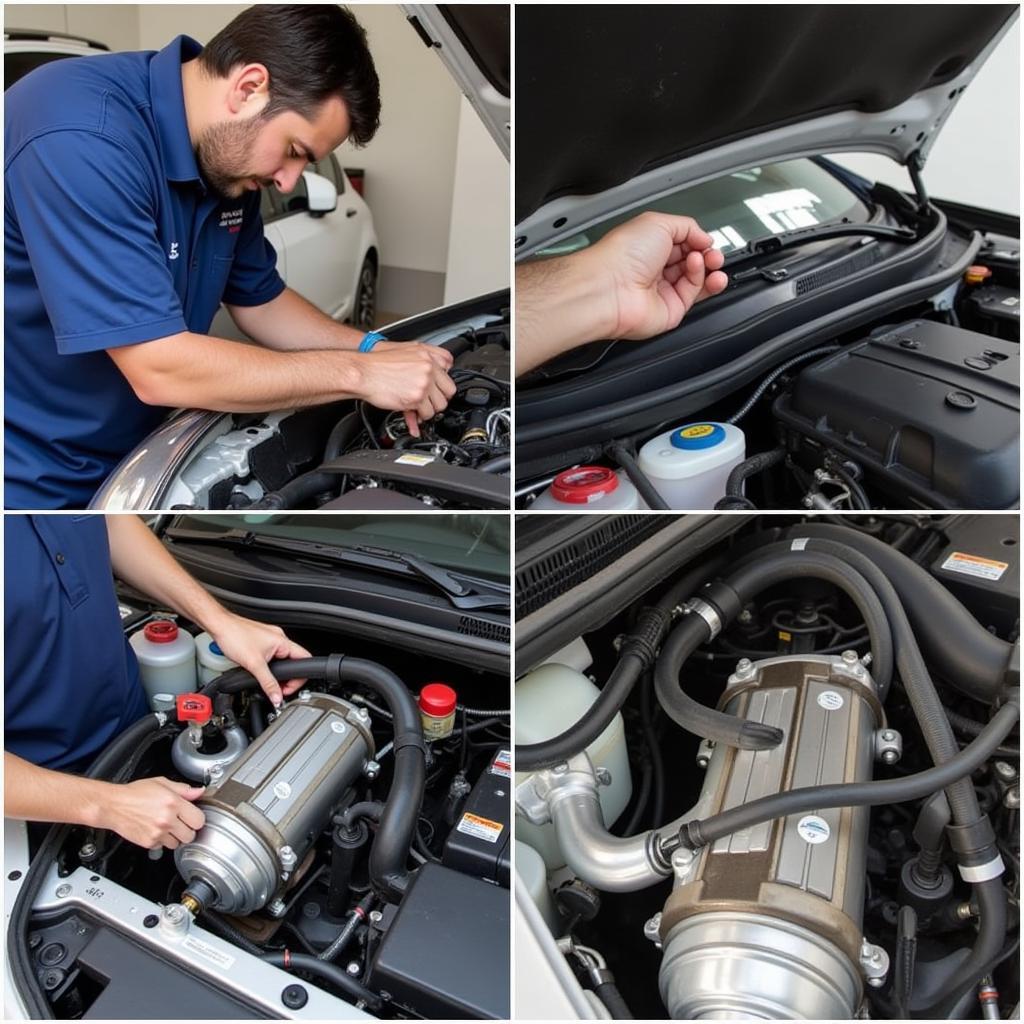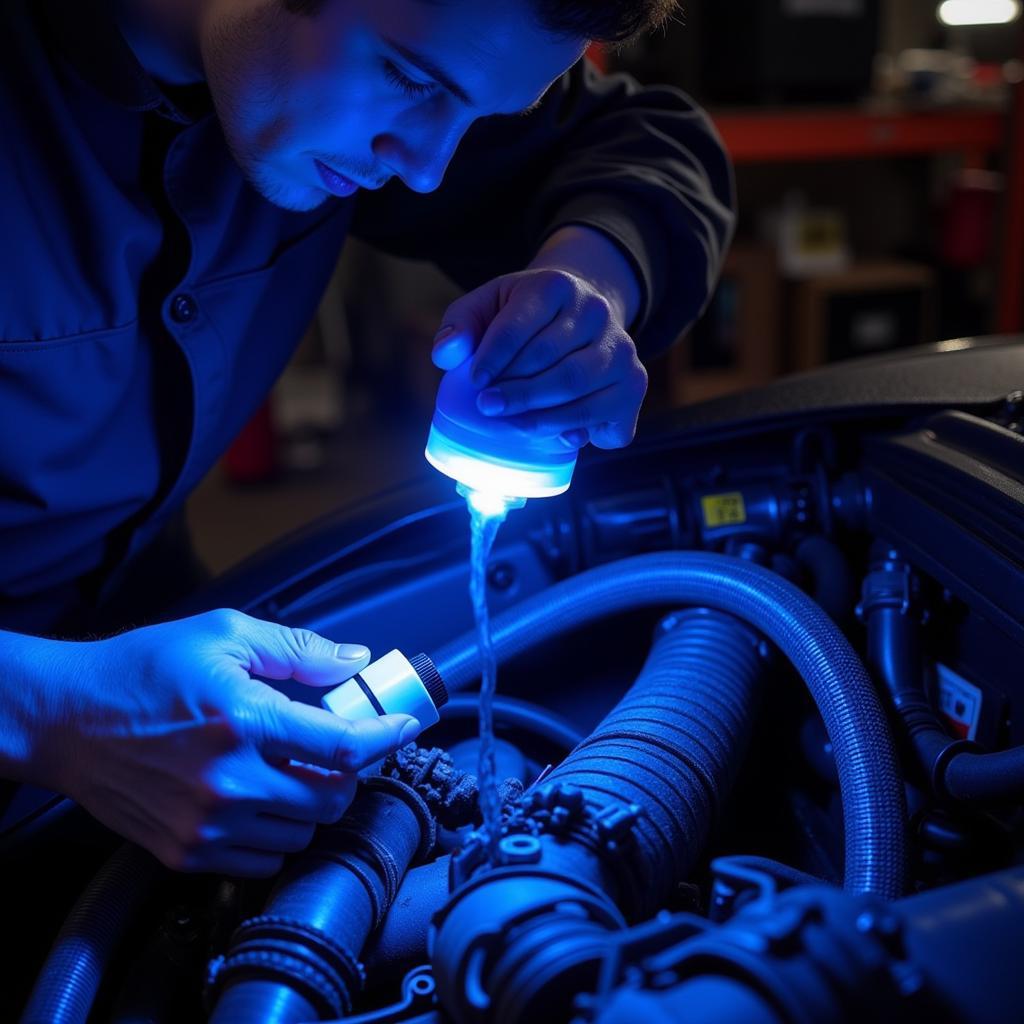What Does a Car AC Service Include?
A car AC service is more than just a quick top-up of refrigerant. It’s a crucial maintenance procedure that ensures your comfort and the longevity of your air conditioning system. Understanding what a car AC service includes can help you make informed decisions about maintaining your vehicle and keep you cool on the hottest days.
Keeping your car’s air conditioning system in top shape is essential for comfortable driving, especially during scorching summers. But What Does A Car Ac Service Include? A comprehensive car AC service addresses several key areas to ensure optimal performance and longevity. These services range from simple checks to more complex repairs, all aimed at keeping you cool and comfortable behind the wheel. After this initial service, routine checks are vital to maintain peak performance. Knowing what to expect during a car AC service can empower you to discuss your needs effectively with your mechanic and make informed decisions about your vehicle’s maintenance.
Similar to regular maintenance like oil changes or tire rotations, AC service is essential. A complete AC check involves inspecting various components, including the compressor, condenser, evaporator, and expansion valve. The process might also involve checking for leaks and evaluating the overall system performance. Just as you would learn how to know if your car has been serviced, understanding the intricacies of an AC service allows you to be a more proactive car owner. If you’re curious about car maintenance costs, you might want to check out how much is a general car service.
Decoding the Car AC Service
A typical car AC service involves several key steps:
- Refrigerant Recovery and Recharge: This involves removing the old refrigerant, measuring it, and then recharging the system with the correct amount of fresh refrigerant. Low refrigerant levels are a common cause of poor AC performance.
- System Performance Test: This test measures the air temperature at the vents to ensure the system is cooling effectively. It helps identify potential issues with the compressor, condenser, or other components.
- Leak Detection: A specialized dye is often used to detect leaks in the system. Leaks can lead to refrigerant loss and reduced cooling capacity.
- Component Inspection: The mechanic will visually inspect all major AC components, including the compressor, condenser, evaporator, and expansion valve, for signs of damage or wear.
- Condenser Cleaning: The condenser, located at the front of the vehicle, can become clogged with debris, reducing its efficiency. Cleaning the condenser improves airflow and cooling performance.
- Cabin Air Filter Replacement: This filter cleans the air entering the cabin and should be replaced regularly to maintain air quality. A clogged filter can restrict airflow and reduce AC effectiveness.
After the service is complete, the technician will explain the work performed and any recommendations for future maintenance.
Want to learn more about car maintenance options? Check out is the car dealership the best place for car service.
 Car AC Service Refrigerant Recharge
Car AC Service Refrigerant Recharge
Why is Regular Car AC Service Important?
Regular AC service is crucial for several reasons:
- Optimal Performance: A well-maintained AC system cools your car more efficiently, providing a more comfortable driving experience.
- Improved Fuel Efficiency: A struggling AC system puts extra strain on the engine, reducing fuel economy. Regular servicing keeps the system running smoothly, maximizing fuel efficiency.
- Extended System Life: Proper maintenance prevents premature wear and tear on AC components, extending the life of the system and saving you money on costly repairs.
- Healthier Air Quality: Regular cabin air filter replacements ensure clean, healthy air inside the cabin, free of dust, pollen, and other allergens.
Common AC Problems and Their Solutions
- Weak Airflow: This could be due to a clogged cabin air filter, a faulty blower motor, or low refrigerant levels.
- Warm Air: Low refrigerant, a malfunctioning compressor, or a blocked condenser are common causes of warm air blowing from the vents.
- Unusual Noises: Strange noises from the AC system could indicate a problem with the compressor, fan belt, or other components.
 Car AC Service Component Inspection
Car AC Service Component Inspection
Looking for hair care tips? Check out what are the hair care services provided in professional salon.
How Often Should You Service Your Car AC?
It’s generally recommended to have your car’s AC system serviced every 1-2 years or as recommended in your vehicle’s owner’s manual. More frequent servicing may be necessary if you live in a hot climate or drive frequently. Regular checks help identify potential issues early on, preventing costly repairs down the road.
 Car AC Service Leak Detection
Car AC Service Leak Detection
Interested in car loan payments? See how to payment first service credit union car loan.
Conclusion
Understanding what a car AC service includes empowers you to make informed decisions about your vehicle’s maintenance. Regular servicing ensures optimal cooling performance, improves fuel efficiency, extends the system’s lifespan, and promotes healthier air quality. By addressing potential issues proactively, you can enjoy a comfortable and reliable driving experience, especially during those hot summer months.
FAQ
- How long does a car AC service typically take? A standard car AC service can take anywhere from 1-2 hours.
- How much does a car AC service cost? The cost varies depending on the services required but generally ranges from $100 to $300.
- Can I service my car AC myself? While some basic maintenance tasks can be performed at home, it’s best to leave AC servicing to a qualified technician.
- How often should I replace my cabin air filter? It’s recommended to replace your cabin air filter every 12,000-15,000 miles or annually.
- What are the signs of a low refrigerant charge? Weak airflow and warm air from the vents are common signs of low refrigerant.
- How can I improve my car AC’s efficiency? Regular servicing, parking in the shade, and using the recirculation setting can improve AC efficiency.
- Is it bad to run the AC on high all the time? Running the AC on high constantly can put extra strain on the system and reduce fuel efficiency.
Common Scenarios
- Scenario 1: Your AC is blowing warm air. This could indicate low refrigerant, a faulty compressor, or a blocked condenser.
- Scenario 2: You hear strange noises coming from your AC. This might signify a problem with the compressor, fan belt, or other components.
- Scenario 3: The airflow from your vents is weak. A clogged cabin air filter, a faulty blower motor, or low refrigerant could be the culprit.
Further Exploration
For further reading, explore our articles on general car service costs and choosing the right service provider.
Need help with your car AC? Contact us via WhatsApp: +1(641)206-8880, Email: [email protected], or visit us at 456 Oak Avenue, Miami, FL 33101, USA. Our 24/7 customer service team is always ready to assist you.
